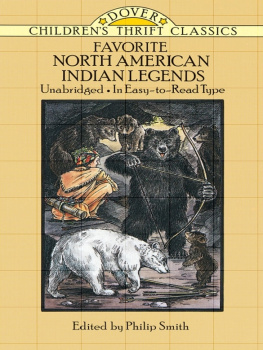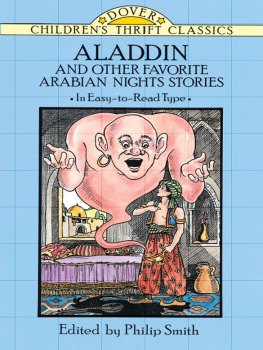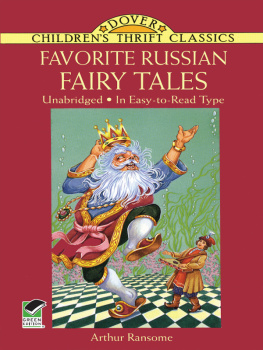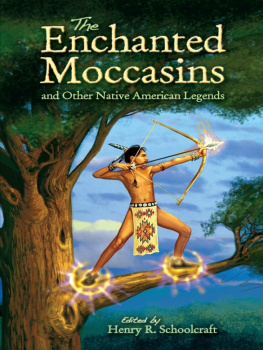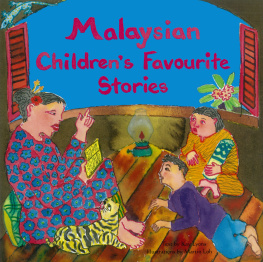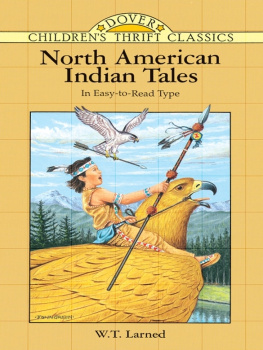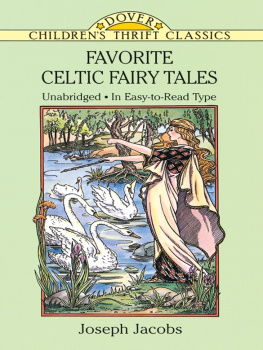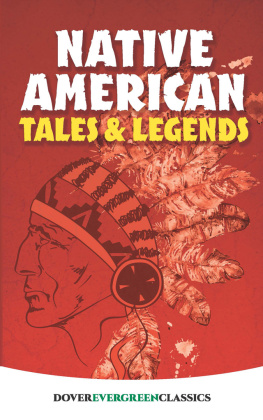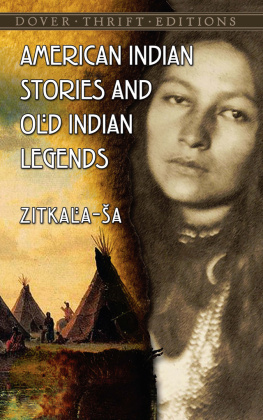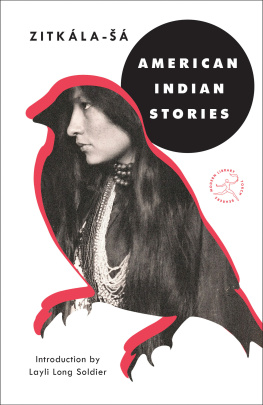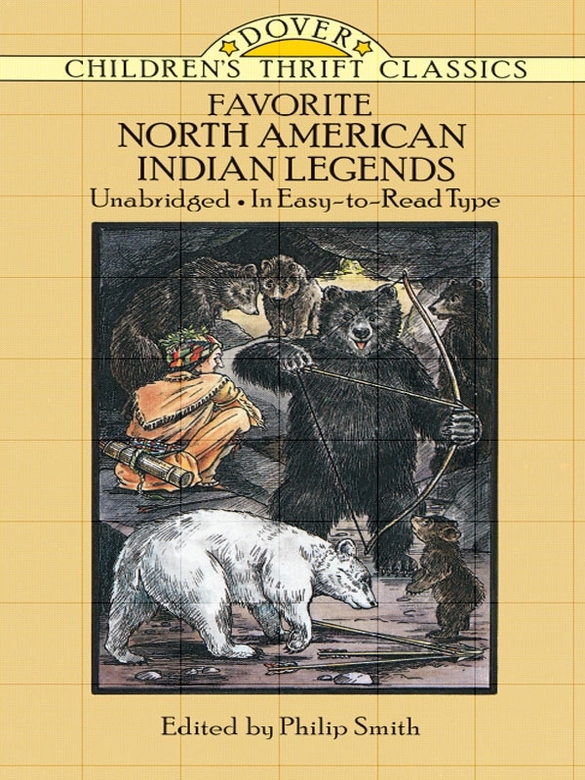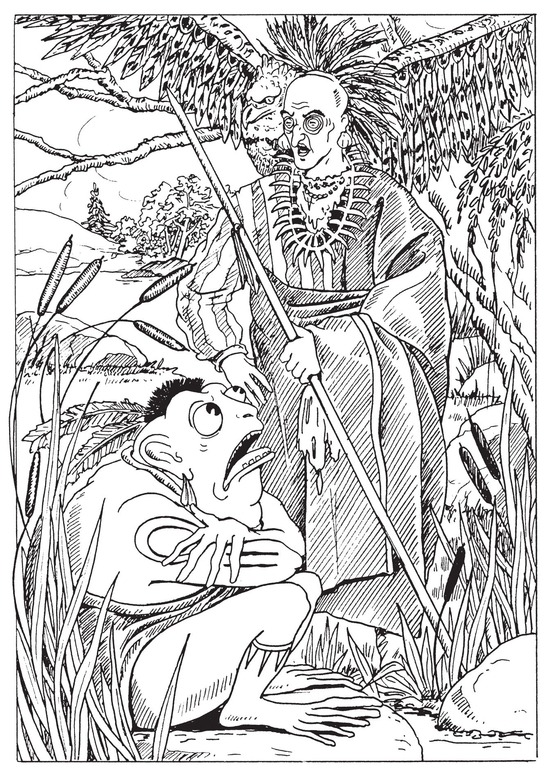How Glooskap Conquered the Great Bull-Frog
(PASSAMAQUODDY AND MICMAC)
N KARNAYOO, of old times, there was an Indian village far away among the mountains, little known to other men. And the dwellers therein were very comfortable: the men hunted every day, the women did the work at home, and all went well in all things save in this. The town was by a brook, and except in it there was not a drop of water in all the country round, unless in a few rain-puddles. No one there had ever found even a spring.
Now these Indians were very fond of good water. The brook was of a superior quality, and they became dainty over it.
But after a time they began to observe that the brook was beginning to run low, and that not in the summer time, but in autumn, even after the rains. And day by day it diminished, until its bed was as dry as a dead bone in the ashes of a warm fire.
Now it was said that far away up in the land where none had ever been there was on this very stream another Indian village; but what manner of men dwelt therein no one knew. And thinking that these people of the upper country might be in some way concerned in the drought, they sent one of their number to go and see into the matter.
And after he had traveled three days he came to the place; and there he found that a dam had been raised across the rivulet, so that no water could pass, for it was all kept in a pond. Then asking them why they had made this mischief, since the dam was of no use to them, they bade him go and see their chief, by whose order this had been built.
And when he came to him, there lay lazily in the mud a creature who was more of a monster than a man, though he had a human form. For he was immense to measure, like a giant, fat, bloated, and brutal to behold. His great yellow eyes stuck from his head like pine-knots, his mouth went almost from ear to ear, and he had broad, skinny feet with long toes, exceeding marvelous.
The messenger complained to this monster, who at first said nothing, and then croaked, and finally replied in a loud bellow,
Do as you choose,
Do as you choose,
Do as you choose.
What do I care?
What do I care?
What do I care?
If you want water,
If you want water,
If you want water,
Go somewhere else.
Then the messenger remonstrated, and described the suffering of the people, who were dying of thirst. And this seemed to please the monster, who grinned. At last he got up, and, making a single spring to the dam, took an arrow and bored a hole in it, so that a little water trickled out, and then he bellowed,
Up and begone!
Up and begone!
Up and begone!
So the man departed, little comforted. He came to his home, and for a few days there was a little water in the stream; but this soon stopped, and there was great suffering again.
Now these Indians, who were the honestest fellows in all the world, and never did harm to any one save their enemies, were in a sorry pickle. For it is a bad thing to have nothing but water to drink, but to want that is to be mightily dry. And the great Glooskap, who knew all that was passing in the hearts of men and beasts, took note of this, and when he willed it he was among them; for he ever came as the wind comes, and no man wist how.
And just before he came all of these good fellows had resolved in council that they would send the boldest man among them to certain death, even to the village which built the dam that kept the water which filled the brook that quenched their thirst, whenever it was not empty. And when there he was either to obtain that they should cut the dam, or do something desperate, and to this intent he should go armed, and sing his death-song as he went. And they were all agog.
Then Glooskap, who was much pleased with all this, for he loved a brave man, came among them looking terribly ferocious; in all the land there was not one who seemed half so horrible. For he appeared ten feet high, with a hundred red and black feathers in his scalp-lock, his face painted like fresh blood with green rings round his eyes, a large clamshell hanging from each ear, a spread eagle, very awful to behold, flapping its wings from the back of his neck, so that as he strode into the village all hearts quaked. Being but simple people, they accounted that this must be, if not Lox the Great Wolverine, at least Mitchehant, the devil himself in person, turned Wabanaki; and they admired him greatly, and the squaws said they had never seen aught so lovely.
Then Glooskap, having heard the whole story, bade them be of good cheer, declaring that he would soon set all to rights. And he without delay departed up the bed of the brook; and coming to the town, sat down and bade a boy bring him water to drink. To which the boy replied that no water could be had in that town unless it were given out by the chief. Go then to your chief, said the Master, and bid him hurry, or, verily, I will know the reason why. And this being told, Glooskap received no reply for more than an hour, during which time he sat on a log and smoked his pipe. Then the boy returned with a small cup, and this not half full, of very dirty water.
So he arose, and said to the boy, I will go and see your chief, and I think he will soon give me better water than this. And having come to the monster, he said, Give me to drink, and that of the best, at once, thou Thing of Mud! But the chief reviled him, and said, Get thee hence, to find water where thou canst. Then Glooskap thrust a spear into his belly, and lo! there gushed forth a mighty river; even all the water which should have run on while in the rivulet, for he had made it into himself. And Glooskap, rising high as a giant pine, caught the chief in his hand and crumpled in his back with a mighty grip. And lo! it was the Bull-Frog. So he hurled him with contempt into the stream, to follow the current.
Give me to drink, and that of the best, at once, thou Thing of Mud!
And ever since that time the Bull-Frogs back has crumpled wrinkles in the lower part, showing the prints of Glooskaps awful squeeze.
Then he returned to the village; but there he found no people, no, not one. For a marvelous thing had come to pass during his absence, which shall be heard in every Indians speech through all the ages. For the men, being, as I said, simple, honest folk, did as boys do when they are hungry, and say unto one another, What would you like to have, and what you? Truly, I would be pleased with a slice of hot venison dipped in maple-sugar and bears oil. Nay, give me for my share succotash and honey. Even so these villagers had said, Suppose you had all the nice cold, fresh, sparkling, delicious water there is in the world, what would you do?
And one said that he would live in the soft mud, and always be wet and cool.
And another, that he would plunge from the rocks, and take headers, diving into the deep, cold water, drinking as he dived.
And the third, that he would be washed up and down with the rippling waves, living on the land, yet ever in the water.
Then the fourth said, Verily, you know not how to wish, and I will teach you. I would live in the water all the time, and swim about in it forever.
Now it chanced that these things were said in the hour which, when it passes over the world, all the wishes uttered by men are granted. And so it was with these Indians. For the first became a Leech, the second a Spotted Frog, the third a Crab, which is washed up and down with the tide, and the fourth a Fish. Ere this there had been in all the world none of the creatures which dwell in the water, and now they were there, and of all kinds. And the river came rushing and roaring on, and they all went headlong down to the sea, to be washed into many lands over all the world.

